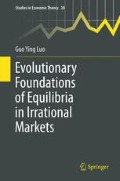Abstract
One of the core building blocks in traditional economic theory is the equilibrium concept (e.g., perfectly competitive equilibrium, monopolistically competitive equilibrium, and informationally efficient equilibrium). Many of the classic equilibrium concepts are derived or established on the basis of the rationality of the individual participants in the sense that they are capable of maximizing their utility, or their profits or forming rational expectation in such a way that a particular equilibrium can be achieved at an aggregate level. For example, the perfectly competitive equilibrium is described to be a market equilibrium outcome in an industry with free entry and exit and completely mobile resources provided that all firms are profit maximizers. Similarly, although Chamberlin and Robinson arrive at monopolistically competitive equilibrium with different techniques, both of their original arguments for deriving this equilibrium rely heavily on rationality and purposive profit maximization. The notion of firms maximizing profits within a monopolistic context has remained in modern analyses of monopolistic competition (e.g., Spence (1976) and Hart 1985a,1985b). Also, an informationally efficient equilibrium can be achieved in the Bayesian Rational Expectation Equilibrium framework if traders are rational, in the sense that they maximize expected utility and form rational expectations. This is shown by Grossman (1976, ), Radner (1979), Hellwig (1980), Allen (1981), and Bray (1981). A new alternative approach to the Bayesian Rational Expectation Equilibrium framework is Maximin Rational Expectation Equilibrium (MREE), see Castro et al. (2011). This approach can be used to examine market efficiency if market individual participants are rational and able to solve the complex problem set up by MREE framework.
Access this chapter
Tax calculation will be finalised at checkout
Purchases are for personal use only
References
Alchian, A. 1950. Uncertainty, Evolution and Economic Theory. Journal of Political Economy 58:211–222.
Allen, B. 1981. “Generic Existence of Equilibria for Economies with Uncertainty When Prices Convey Information”. Econometrica 49:1173–1199.
Bray, M. 1981. “Futures Trading, Rational Expectations, and the Efficient Markets Hypothesis”. Econometrica 49:575–596.
Castro, L.I. de, Marialaura, P., and Yannelis, N. 2011. “A new perspective to rational expectations:maximin rational expectations equilibrium”. Working paper, Department of Economics, University of Illinois at Urbana Champaign.
Enke, S. 1951. On Maximizing Profits: A Distinction Between Chamberlin and Robinson. American Economic Review 41:566–578.
Friedman, M. 1953. Essays in Positive Economics, Univ. of Chicago Press: Chicago.
Grossman, S.J. 1976. “On the Efficiency of Competitive Stock Markets where Traders Have Diverse Information”. Journal of Finance 31:573–585.
Grossman, S.J. 1978. “Further Results On the Informational Efficiency of Competitive Stock Markets”. Journal of Economic Theory 18:81–101.
Hart, O.D. 1985a. Monopolistic Competition in the Spirit of Chamberlin: A General Approach. Review of Economic Studies LII:529–546.
Hart, O.D. 1985b. Monopolistic Competition in the Spirit of Chamberlin: Special Results. The Economic Journal 95:889–908.
Hellwig, M.F. 1980. “On the Aggregation of Information in Competitive Markets”. Journal of Economic Theory 22:477–498.
Penrose, E. T. 1952. “Biological analogies in the theory of the firm”. American Economic Review 42:804–819.
Radner, R. 1979. “Rational Expectations Equilibrium: Generic Existence and the Information Revealed by Prices”. Econometrica 47:655–678.
Spence, M. 1976. Product Selection, Fixed Costs, and Monopolistic Competition. Review of Economic Studies 43:217–235.
Author information
Authors and Affiliations
Corresponding author
Rights and permissions
Copyright information
© 2012 Springer Science+Business Media, LLC
About this chapter
Cite this chapter
Luo, G.Y. (2012). Introduction. In: Evolutionary Foundations of Equilibria in Irrational Markets. Studies in Economic Theory, vol 28. Springer, New York, NY. https://doi.org/10.1007/978-1-4614-0712-6_1
Download citation
DOI: https://doi.org/10.1007/978-1-4614-0712-6_1
Published:
Publisher Name: Springer, New York, NY
Print ISBN: 978-1-4614-0711-9
Online ISBN: 978-1-4614-0712-6
eBook Packages: Business and EconomicsEconomics and Finance (R0)

